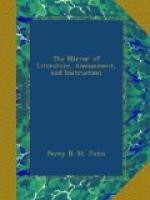Not long after the massacre of St. Bartholomew the throne was occupied by Henry de Valois, brother to Charles the Ninth, and son of Catherine. He was a prince of good appetite, a lover of wine and good cheer, qualities which his mother had carefully fostered and cultivated, that she alone might hold the reigns of government. Henry de Valois spent whole days at table, and the constellations of the kitchen shone with the greatest splendour under this gourmand king. We date from the beginning of his reign the invention of the fricandeau, generally attributed to a Swiss. Now the fricandeau having its Columbus, its discovery appears not more wonderful than that of America, and yet it required une grande force de tete.
Though we acknowledge the immense influence this monarch had over cookery, we must not conceal that he brought in fashion aromatic sauces, tough macaroni, cullises, and brown sauces calcined by a process like that of roasted coffee. These sauces gave the dishes a corrosive acidity, and as Jourdan le Cointe remarks, far from nourishing the body, communicated to it a feverish sensation, which baffled all the skill of physicians, in their attempts to cure it. They were positive poisons which the Italians had introduced into France, a taste for which spread through every class of society.
Under the reign of Henry III. a taste for warm drinks was joined to that of spicy dishes. Hippocrates recommends hot water in fevers, Avicenna in consumption, Trallien in phrensy, Plato in loathings, Aetius in strangury,—whence we conclude that warm water, having so many different qualities, must have been a very useful article at table, had it only been to assist digestion, considering that people ate copiously in the reign of the Valois. They made not one single repast without a jug full of hot water, and even wine was drunk lukewarm.
If the poor have preserved the memory of Henry IV., we cannot say as much of his cooks. That monarch did nothing for them;—either Nature had not endowed him with a good appetite, (for what prince ever was perfect,) or he looked upon them, as, in the last century, we looked upon soups, as things of hardly any use; but in return they also did nothing for him.
It is very remarkable, that in France, where there is but one religion, the sauces are infinitely varied, whilst in England, where the different sects are innumerable, there is, we may say, but one single sauce. Melted butter, in English cookery, plays nearly the same part as the Lord Mayor’s coach at civic ceremonies, calomel in modern medicine, or silver forks in the fashionable novels. Melted butter and anchovies, melted butter and capers, melted butter and parsley, melted butter and eggs, and melted butter for ever: this is a sample of the national cookery of this country. We may date the art of making sauces from the age of Louis XIV. Under Louis XIII. meat was either roasted or broiled: every baker had a stove where the citizen, as well as the great lord, sent his meat to be dressed; but, by degrees, they began to feel the necessity of sauces.




